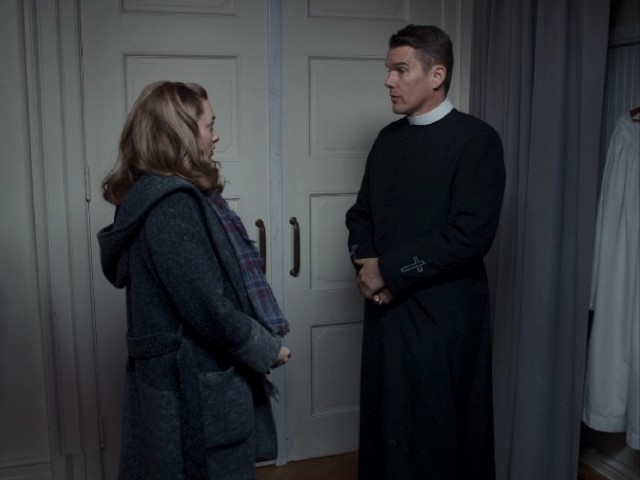Michael Cusumano here with the most recent film I've yet to induct into this series. Despite its newness, it's one of the titles I'm most confident will earn the label of classic in the course of time.

Can you pinpoint the moment someone crosses the line between faith and fanaticism? Is it even possible to fully define the boundaries between the two? Most reasonable people would agree it’s around the moment someone commits an act of violence in the name of God, but an individual crosses that boundary internally long before he straps on a suicide vest.
That elusive moment of radicalization exists somewhere in the vast gray silences of Paul Schrader’s First Reformed. It passes by so quietly that it is possible to be late into the film and have no inkling of the wild-eyed zealot Ethan Hawke’s Reverend Toller will become in the film’s shocking final movement...
Like the environmental Doomsday scenarios that obsess Toller, the process is incremental to the point of being invisible. By the time the situation is clear, the point-of-no-return has long since been passed.
Watching the film again, the once subtle warning signs become glaring, plainly visible even from the fateful meeting between Toller and Philip Ettinger’s Michael at the film's start.

Scene: A Theological Debate
Mary (Amanda Seyfried, quietly excellent) senses her husband Michael tipping over into an abyss of despair, so she requests Reverend Toller visit and counsel her troubled environmentalist husband. What at first seems like one more chore in this disillusioned priest’s daily routine, turns into a theological debate of surprising depth and complexity. On first viewing, it can feel like the scene throws the film out of balance. Just as we’ve given ourselves over to the deliberate rhythms of Toller’s existence - his drinking, his self-lacerating journal entries, his unfulfilling stewardship of an under-attended tourist trap church - we stop for a lengthy dialogue scene set in a single living room. It’s a short play dropped into a film with no comparable scenes. It’s odd shape is Schrader’s way of tipping its significance. We can feel something momentous shifting out of balance even as Toller remains the picture of sanity.
Both Hawke and Ettinger deftly ride a knife’s edge with their performances. Michael is troubled, yes, his anxiety exacerbated by what appears to be severe depression, but crucially, Ettinger does not play Michael as insane. His underlying coherence forces us to delay our judgment. What exactly would the sane reaction to humanity’s imminent extinction look like anyway? For his part, Hawke has to not only traverse an incredible emotional and psychological journey in a way that tracks logically when we see its full scope, but he has to do so with the transformation concealed underneath Toller’s glacial reserve for the bulk of the film. It’s a titanic performance. Schrader requires Toller to carry the agony of divine judgment in his eyes and Hawke is equal to the challenge.

The strict stylistic restrictions Schrader places on First Reformed mirror Toller’s spare lifestyle. The camera is almost always locked down and the editing simulates a sort of monk-like patience, allowing unusual breathing space at the beginning and end of shots. First Reformed trains the viewer to wait for the subject of shots the way Toller waits for God’s will to reveal itself. Schrader rarely breaks these rules, but such violations always accompany a significant moment. Like the one time Toller’s voice-over briefly interrupts the debate:
“I felt like I was Jacob wrestling all night long with the angel. Fighting in the grass. Every sentence, every question, every response a mortal struggle. It was exhilarating.”
As we hear what we assume is his later recounting of the meeting in his journal, the film allows itself a rare camera move, a push-in to a tight close-up on Hawke’s face. The narration and the zoom act as a fleeting X-ray behind Toller’s placid surface. Far from the functionary he appeared to be at first glance, Toller is a militant in hibernation. Like Travis Bickle, the most famous of Schrader’s Lonely Men, Toller needs to assert his will on a world numb to wickedness. Hawke’s man of the cloth is too sane to disappear into a haze of delusion like Travis, but Michael’s righteous cause presents exactly the fuel that Toller’s flickering embers of extremism need to combust and consume him.

After the voice-over narration the conversation turns to the subject of martyrdom. Michael asks the notorious query...
“Can God forgive us, for what we’ve done to this world?”
Toller’s response is the reasonable one. He shakes his head in gentle dismissal
“Who can know the mind of God?”
What, after all, is a fanatic but one who believes he knows exactly what God wants? The steady rationality of Toller’s arguments would suggest he has a comfortable distance from such a rigid outlook. But then the intensity of that X-ray hints of the different, altogether more unsettling story about to unfold.

Follow Michael on Twitter and Letterboxd. More episodes of The New Classics.